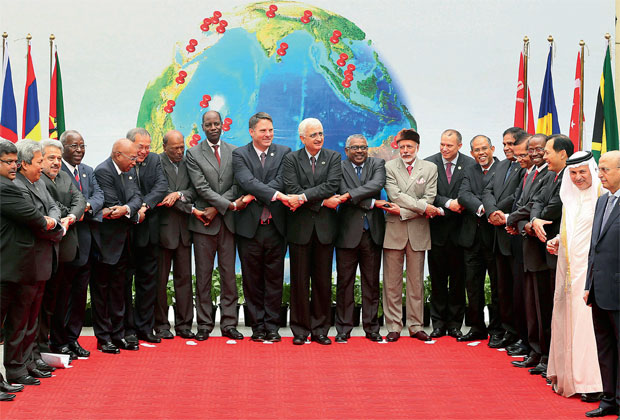
New Delhi, November 3: The UAE is taking its green responsibility seriously and has offered to host the Indian Ocean Rim renewable energy forum next year. Minister of State for Foreign Affairs Dr Anwar Mohammed Gargash, speaking at the 12th ministerial meeting of the association in Gurgaon on Friday, said UAE officials will discuss with the IOR-ARC secretariat on how to take the proposal forward.
The UAE is home to the International Energy Agency and much can be gained by the group in developing and promoting alternative forms of energy.
Dr Gargash also announced the UAE’s contribution of $500,000 to a special fund of the association. He said the country is committed to the group of 20 nations, with Comoros joining as a full member on Friday. “The IOR-ARC must show will and determination for tangible results,” said the minister. He said the organisation needs to be energised through improved coordination, and new projects in member countries.
He warned of the dangers of the eurozone financial crisis spreading to the region and said the group must shield itself with further investments and press ahead through sustainable growth. He mentioned the Abu Dhabi Sustainable Energy Week in January next year and said the UAE is taking the lead in tapping environment-friendly, sustainable sources of energy.
“We must promote cultural understanding and tolerance in this association with its diverse interests and rates of growth,” Dr Gargash said, and added the UAE’s efforts to host Expo 2020 will bring people and businesses together. He said the Indian Ocean Rim group of countries must interact more to grow and expand.
On maritime security, he said the UAE would continue to combat piracy and has been instrumental in bringing warring factions in Somalia together to tackle the problem at source. Pirate attacks off the coast of Somalia have fallen by 50 per cent since that meeting in June and with the formation of a new Somali government.
“There’s a lot more we can do. We must invest time and effort to further the interests of the group,’’ he said.
Growing together
Earlier, the meeting of ministers was inaugurated by Indian External Affairs Minister Salman Khurshid, who echoed Dr Gargash’s call for the 15-year-old grouping to show tangible benefits for the two billion people of these countries.
“There must be greater structure for people in the IOR-ARC countries to grow together,” said Khurshid. Job creation and security are important for the region to prosper, he said. He laid emphasis on economic cooperation, technology exchange, education and development of fisheries in the region. The minister even mooted a university for the Indian Ocean Rim.
India has contributed $1 million for projects being carried out by the association. China, which is a dialogue partner, chipped in with $100,000.
The Indian External Affairs minister said he is committed to maintaining the momentum of the grouping, but suggested a pragmatic approach for holistic development.
The IOR-ARC, which was formed in 1997, is an apolitical body with interests in maritime security, trade and investment, fisheries management, disaster risk reduction, academics, science and tourism. It has three projects in Iran and Oman on fisheries, science and technology and maritime transport.





Comments
Add new comment